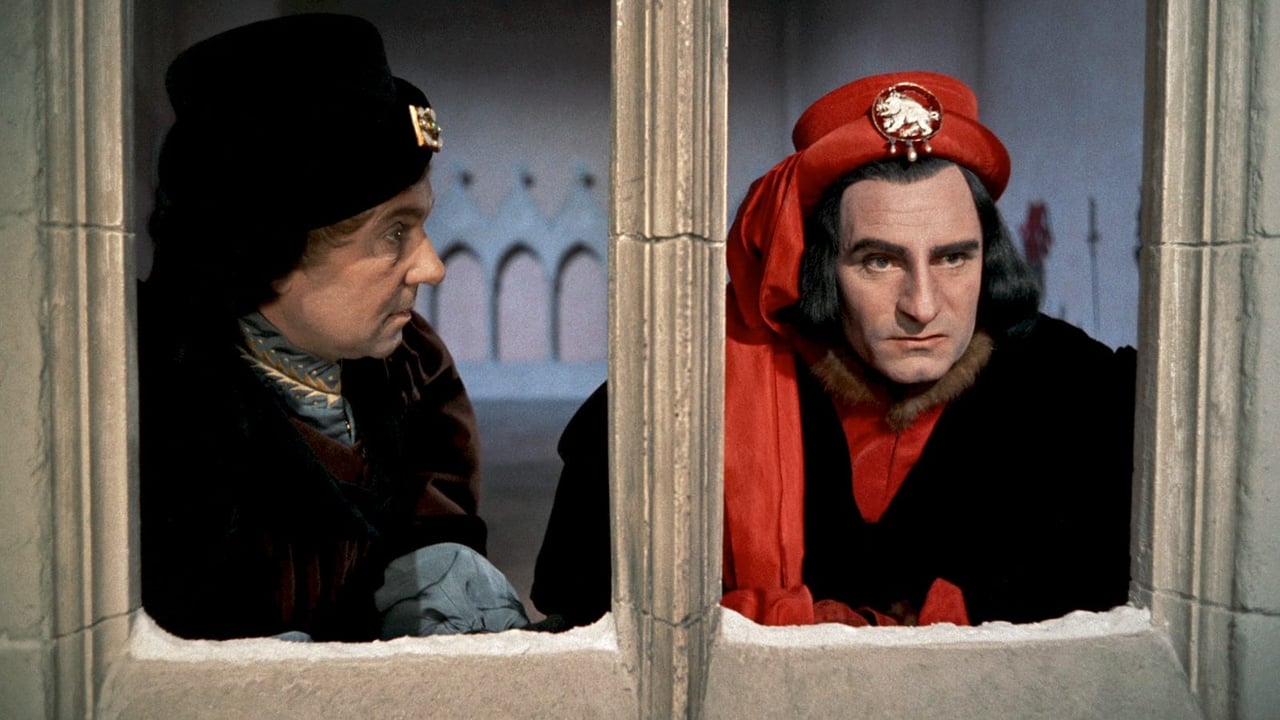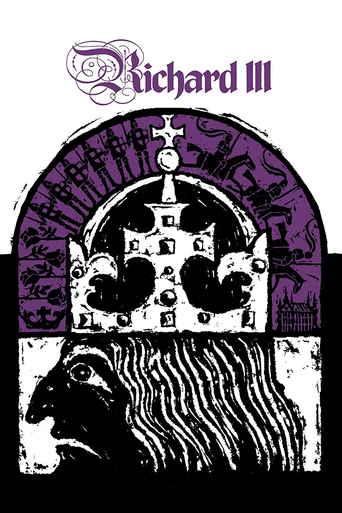

"Richard III" was the third, and last, of the three Shakespearean films directed by Sir Laurence Olivier, after "Henry V" and "Hamlet". The story is too well known to be set out here; indeed, Shakespeare's version of history is probably more familiar than the story of the real King Richard. The prologue states that the film is based as much upon legend as upon historical fact, thereby acknowledging that Shakespeare used a good deal of artistic licence. In some ways, in fact, the film goes even further than Shakespeare in its rewriting of history, although normally for a good artistic reason. The film opens with a scene not found in the play, the coronation of King Edward IV who is accompanied by his wife, two sons and adult brother Richard. In fact, Edward's coronation took place in 1461, when he was unmarried, his sons as yet unborn and Richard still a child. This scene, however, enables Olivier to assemble all the main characters and introduce us to them.The real Edward IV was a strong, vigorous man, standing around 6' 4" tall, who died suddenly at the age of forty. Here he is played by the diminutive, sixty-something Cedric Hardwicke, as a feeble old man. The purpose behind this piece of casting was to emphasise Richard's Machiavellian nature, secretly laying long-term plans to seize the throne in the inevitable event of his brother's demise. (In reality, Richard was probably as taken by surprise as anyone else by his brother's death, and his rise to power was a quick reaction to fast-moving events). Similarly, Edward's death and Richard's seizure of power took place in the spring and early summer of 1483, but here these events are shown as occurring during a bleak, snowy winter, to emphasise that the brief "glorious summer of this sun of York" is now over and that England faces a return to the "winter of our discontent".Olivier does correct one of Shakespeare's inaccuracies by removing the character of Queen Margaret who, at the time of the events depicted, would either have been in exile, or dead. This, however, was probably an inadvertent by-product of Olivier's cutting the original text to produce something more suited to the cinema. On the stage "Richard III" can be a rather unwieldy play, with a full production lasting up to four hours; at just under three hours the film is already considerably longer than the average fifties feature film.Unlike some more recent productions of the play, most notably Richard Loncraine's film from 1995 which updates the story to the 1930s and quite deliberately portrays Richard as a fascist-style dictator, Olivier does not attempt to draw parallels- at least not explicit ones- between Shakespeare's story and modern politics. (Of course, one could argue that those parallels are still there because Shakespeare understood the essential psychology underlying fascism and communism long before either ideology formally existed). Like Olivier's Henry V, the film is shot in vivid colour and attempts to reproduce the visual splendour of the Middle Ages with authentic period costumes. Most of it was shot on stylised Gothic sets in the studio, although the final scenes depicting the Battle of Bosworth Field were for some reason filmed on location in a region of Spain that looks nothing like Leicestershire.Olivier's Richard is not just a pantomime villain; he is also a consummate hypocrite, able to be all things to all men as the occasion demands, so Olivier has to call upon the full range of his acting skills to play the parts of loyal brother, ardent lover and man of the people as well as ranting tyrant. Although Olivier plays him with a limp, Richard's disabilities are not as evident as in some productions, so his speeches lamenting his "misshapen body" seem more like self-pity than genuine complaints. Olivier dominates the play, but there are other good contributions, especially from John Gielgud as Clarence (a far more sympathetic figure than the treacherous drunkard of legend) and Claire Bloom in the thankless role of Lady Anne, Richard's wife, who should have every cause to hate him but who inexplicably marries him.The film was not a great box-office success when first released in 1955, particularly in America where its prospects were harmed by the curious decision to broadcast it on American television on the day that it opened at the cinema. That relative failure ended Olivier's series of Shakespearean dramas; a film of "Macbeth" scheduled for 1957 had to be cancelled when Olivier was unable to secure the necessary funding. (That must be one of the great unmade films of cinema history!) Today, however, its reputation seems secure as a classic, at least as good as the Oscar-winning "Henry V" which was much-praised upon its release. Olivier's performance as Richard, portraying him as (in the words of the historian Professor Richard Harrison) that "slit-eyed, snaky, deformed embodiment of evil" has passed into legend; for many people it has become (to the disgust of the king's modern apologists, and he has many) the definitive image of King Richard III. 8/10 Some goofs. As stated above, a number of key scenes are switched from spring/summer to winter. I have no quarrel with this change, which was done for good artistic reasons, but Olivier should have cut that line about "strawberries" which in the fifteenth century would not have been available out of season. Some of the heraldic banners are incorrect; Lord Stanley, as King of Man, would indeed have been entitled to quarter the Manx arms with his own, but the Manx "three legs" symbol should appear on a red background, not a blue one as here. And Richard III never used the arms attributed to him of a white boar between four white roses on a red shield.
... View MoreI make no apologies for finding Olivier Vastly overrated (alongside Hitchcock, Scorsese, etc) and placing him definitely in last place in the original quartet of thespian knights (you can perm any three of the others, Redgrave, Richardson, Gielgud, and leave old Larry dead in the water) still hype is a powerful force and the Academic/Pseud axis is happy to succumb time and time again. Having an ego slightly smaller than Australia Larry has seen fit to change the celebrated opening soliloquy, cut it when it does appear and intermingle it with speeches from Henry VI Part III and, still not content move Clarences arrest (Shakespeare was content to end the 'now is the winter of our discontent ...' speech with Clarence entering under arrest and Richard's feigned innocence ...'brother, good day, what means this arme'd guard that waits upon your grace?' but Shakespeare's genius is a bad nowhere to Olivier's ego) several minutes down the line. No doubt Larry would cite Orson Welles and Chimes at Midnight (which was actually filmed a good decade after Richard III and remains head and shoulders the best ever film adaptation of Shakespeare) but Welles was openly merging the two parts of King Henry IV and mentions in Henry V to tell the story of Falstaff whereas Olivier was, theoretically at least, filming only Richard III. Still, it does have its admirers and so be it.
... View MoreThe third, last and by far the weakest of the three Shakespearean films directed by Laurence Olivier. I have to admit that, of the Bard's plays with which I am familiar, "Richard III" is my least favourite. It largely lacks the subtlety, strong characters, superlative characterisation, wonderful exploration of themes and beautiful language that define his later plays, particularly "Macbeth" and "Hamlet". That said, the play is far more subtle than the film. I wish that Olivier had made "Macbeth", which would have starred himself and his wife Vivien Leigh, instead.As both an actor and a director, Olivier failed to live up to the high standards that he set for himself in both "Henry V" and "Hamlet". His performance as the title character is too over the top, too obviously villainous, though he is very good in the quieter moments. The fake nose that he wears is unintentionally comical. This is the first time that I've ever been disappointed with one of Olivier's performances, though he is still one of my three favourite actors (the other two being Christopher Lee and Don Ameche). In contrast to the first two films, his direction is pedestrian. It feels like a filmed stage play rather than the film adaptation of one. It looks dull. This is particularly disappointing after the beautiful, vibrant Technicolor of "Henry V" and the even better black and white cinematography of "Hamlet". The Bosworth Field scenes are the best looking ones in the film but still fall far short of those films. At 2 hours and 38 minutes, it's far too long and not very well paced.Unfortunately, it seemed that Olivier set the tone for much of the acting in the film. Claire Bloom (who later matured into a very good actress) and Cedric Hardwicke both devour the scenery as the Lady Anne and King Edward IV respectively. I wish that Olivier had cast either Jean Simmons (who played Ophelia in "Hamlet") or Vivien Leigh as Anne. Ralph Richardson is just dull as the Duke of Buckingham. Olivier had considered casting Orson Welles as Buckingham and I wish that he had. The best actors in the film are the only ones who give consistently subtle performances such as Andrew Cruickshank as Brackenbury, Alec Clunes (Martin's dad) as Lord Hastings, Laurence Naismith as Lord Stanley, Norman Wooland (who previously played Horatio in "Hamlet") as Sir William Catesby, Stanley Baker as the soon to be Henry VII and the great John Gielgud as the Duke of Clarence. It also has many appearances from great characters actors such as Michael Gough, Michael Ripper, George Woodbridge, Patrick Troughton (who, unlike in "Hamlet", actually has some lines), Esmond Knight, John Laurie and Russell Thorndike. Knight, Laurie and Thorndike are the only actors other than Olivier himself to appear in all three of his Shakespearean films while Knight and the latter sister's Sybil Thorndike appeared in his next film "The Prince and the Showgirl".
... View MoreShakespeare himself must rejoice whenever this version of his play/movie is shown. It boasts his own witty dialogue placed in the mouths of some of the greatest actors of our times to make it understood these several centuries later. It's in technicolor so you see the pomp & circumstance in glorious Technicolor (literally). You even get the humor dripping with bitter irony most of the time. The one flaw of the film was the decision of Olivier's make-up (or lack of it). It's clear from Shakespeare's description in Olivier's/Richard's first soliliquoy that Shakespeare wants him to be shown deformed & heavily so. He should look like Charles Laughton in The Hunchback of Notre Dame. But, perhaps because Olivier didn't want himself disfigured, the only hint we get is a limp. I think this does discredit to the author even though it plays to the prejudice that Hunchback fought against, that the deg formed are evil. Having said that, it's a wonderful movie & a classic that can be forgiven its one flaw of perfection.
... View More